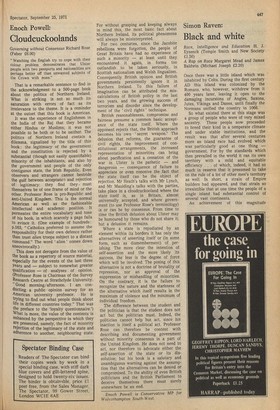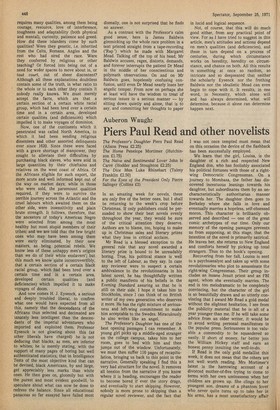Simon Raven:
Black and white
Race, Intelligence and Education H. J. Eysenck (Temple Smith and New Society £1.50) A Rap on Race Margaret Mead and James Baldwin (Michael Joseph £2.20)
Once there was a little island which was inhabited by Celts. During the first century AD this island was colonized by the Romans, who, however, withdrew from it 400 years later, leaving it open to the damaging incursions of Angles, Saxons, Jutes, Vikings and Danes, until finally the Normans unified the country in 1066.
So what existed there at this stage was a group of people who were of very mixed ancestry. These people now proceeded to breed their kind in a temperate climate and under stable institutions, and the result was that after several centuries more an island race had evolved which was particularly good at one thing — government. For by the standards which then prevailed in the world it ran its own territory with a mild and equitable efficiency . . . of which, indeed, it had so much in reserve that it presumed to take on the rule of a lot of other men's territory as well. In short, a strain of Empire builders had appeared, and that strain so irresistible that at one time the people of a single island had substantial control of several vast continents.
An achievement of this magnitude requires many qualities, among them being courage, resource, love of interference, toughness and adaptability (both physical and mental), curiosity, patience and greed. How did these islanders come by such qualities? Were they genetic, i.e. inherited from the Celts, Romans, Angles and the rest who had sired the race. Were they conferred by religious or other teaching? Or forced into being out of a need for wider spaces to move about in, or tout court, out of sheer discontent? Although all these explanations doubtless contain some of the truth, in what ratio to the whole or to each other they contain it nobody really knows. We must merely accept the facts, which are that a certain section of a certain white racial group, which had been bred over a certain time and in a certain area,, developed certain qualities (and deficiencies) which impelled it to make voyages of dominion.
Now, one of the continents which it penetrated was called North America, to which it had been sending religious dissenters and other assorted delinquents ever since 1620. Since these were faced with a grave shortage of Manpower, they sought to alleviate their difficulties by purchasing black slaves, who were sold in large quantities by their chieftains and relatives on the west coast of Africa. Of the Africans eligible for such export, the more acute and well informed kept out of the way on market days; while in those who were sold, the paramount qualities required, if they were to survive the terrible journey across the Atlantic and the cruel labours which awaited them on the other side, were insensitivity and plain brute strength. It follows, therefore, that the ancestors of today's American Negro were selected from among the most healthy but most stupid members of their tribes; and we are told that the few bright ones who may have been among them were early eliminated, by their new masters, as being potential rebels. We know less of these unhappy men's origins than we do of their white enslavers'; but this much we know quite incontrovertibly, that a certain section of a certain black racial group, which had been bred over a certain time and in a certain area, developed certain qualities (and deficiencies) which impelled it to make voyages of doom.
And now comes H. J. Eysenck, a serious and deeply troubled liberal, to confirm what one would have expected from all this, namely that the descendants of the Africans thus selected and decimated are innately less intelligent than the descendants of the imperial adventurers who imported and exploited them. Professor Eysenck is not gloating about this (as other liberals have charged) he is not deducing that blacks, as men, are inferior to whites; he is merely stating, with the support of many pages of boring but well authenticated statistics, that in Intelligence Tests of the most objective kind that can be devised, black Americans, by and large, get appreciably less marks than white ones. He then goes on, gloomily but with the purest and most evident goodwill, to speculate about what can now be done to redress the balance. Since all educational panaceas so far essayed have failed most dismally, one is not surprised that he finds no answer.
As a contrast with the Professor's calm good sense, here is James Baldwin gimmicking up the whole race problem in a text printed straight from a tape-recording ('Rap ') which he made with Margaret Mead. Talking off the top of his head, Mr Baldwin accuses, rages, distorts, demands, and forever interrupts the patient Dr Mead in the middle of her conscientious and polymath observations. On and on Mr Baldwin goes, hopelessly confusing confusion, until even Dr Mead nearly loses her angelic temper. From now on perhaps she at least will have the wisdom to treat of serious issues in a serious manner — by sitting down quietly and alone, that is to say, and committing her thoughts to paper in lucid and logical sequence.
Not, of course, that this will do much good either, from any practical point of view. For as I have tried to suggest in this article, men's attitudes and actions depend on men's qualities (and deficiencies), and these in turn depend on a process of centuries, during which circumstance works on heredity, heredity on circumstance, and chance on both. All this results in something at once so random, so intricate and so deepseated that neither the scholarly Eysenck nor the frothing Baldwin nor the idealistic Mead can even begin to cope with it. It results, in one word, in Necessity, which alone will and has always determined, what will determine, because it alone can determine happen next.



































 Previous page
Previous page